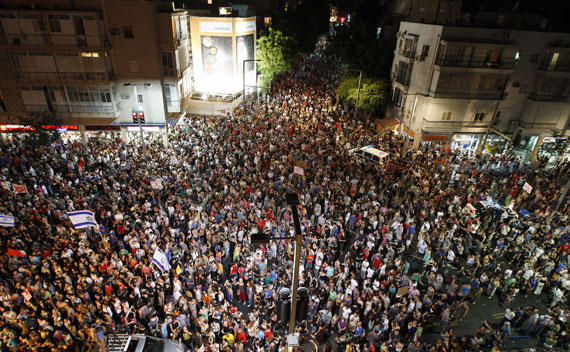More on:

In case you haven’t heard, the Middle Eastern uprisings have made their way to Israel. Over last weekend some pundits (including a few from the region) declared that the example of Arab people power had encouraged Israelis to go out and demonstrate against tyranny. Midan Tahrir comes to Kikar Rabin sort of thing. Indeed, there were an estimated 300,000 people—apparently from all walks of life—in Israel’s streets on Saturday night. There were banners that read, “Walk like an Egyptian” and a friend sent me a twitpic (a picture that had been tweeted) of a large sign that Israeli protesters were carrying that demanded “Irhal” or “Leave” in Arabic. All very interesting, but not exactly the Israeli analogue of the upheavals taking place in the Arab world. Contrary to much of the commentary, the rebellions in Tunisia, Egypt, Libya, Syria, Bahrain, and Yemen were not principally about economic conditions. No doubt difficult times were an intervening variable that contributed to massive dissatisfaction, but Arabs have poured into the streets largely to demand freedom from tyranny. The nearly obsessive focus on Egypt’s economy since Hosni Mubarak’s fall, for example, obscures the fact that the instigators of the Egyptian uprising were largely upper middle class and that it took quite some time for powerful groups like Labor to marry their pocketbook demands to the rigged political system that Mubarak oversaw.
Israel’s democracy is far from perfect. The Law for the Prevention of Damage to the State of Israel through Boycott that made calling for a boycott of products produced in West Bank settlements illegal; a 2010 amendment to the Citizenship Law, which requires that individuals make an oath of loyalty to Israel as a Jewish and democratic state; and a recent proposal to drop Arabic (the native tongue of 20 percent of Israeli citizens) as an official language are all widely regarded to be anti-democratic. Still, even if Israelis abhor their current government were not demanding regime change. What many of them seem to want, however, is for the government to revitalized the egalitarian ethos of Israel’s founding myths. Israel’s middle class is getting squeezed by the high cost of housing, electricity—which the attacks on the Arish-Ashkelon gas pipeline since the Egyptian uprising have made worse—and food.
The government responded with expressions of understanding and some ministers even expressed pride that Israelis were still capable of mustering a communal spirit, though they did not indicate a change in policy. Yet Prime Minister Netanyahu is politically vulnerable on this issue. Netanyahu (by the way, I refuse to refer to him as “Bibi”) is genetically a Likudnik, but if he had kept his American passport and name—Ben Nitay—he would almost certainly be a Republican. The economic reforms that he undertook while Finance Minister between 2003 and 2005 were not Jabotinsky’s inspiration, but rather Friedman’s (as in Milton). The prime minister can be credited with creating an environment conducive to Israel’s security-driven high-tech entrepreneurial success, but gutting social programs, housing subsidies (except for those in the West Bank), and welfare payments that at one time helped make life affordable for average and poorer Israelis may yet come back to haunt Netanyahu. I would not expect Israel’s high-command to issue cryptic statements about being in “continuous consultation” and bundle the prime minister off to Eilat any time soon, but Netanyahu wasn’t a lock when he “won” the February 2009 elections—Likud actually got one less seat than Kadima—and he seems potentially vulnerable at this moment.
More on: